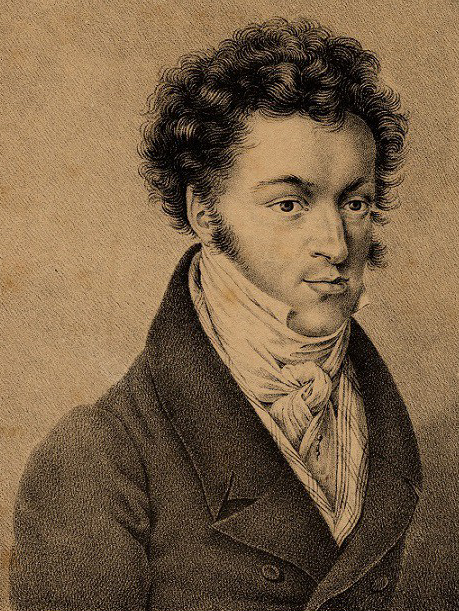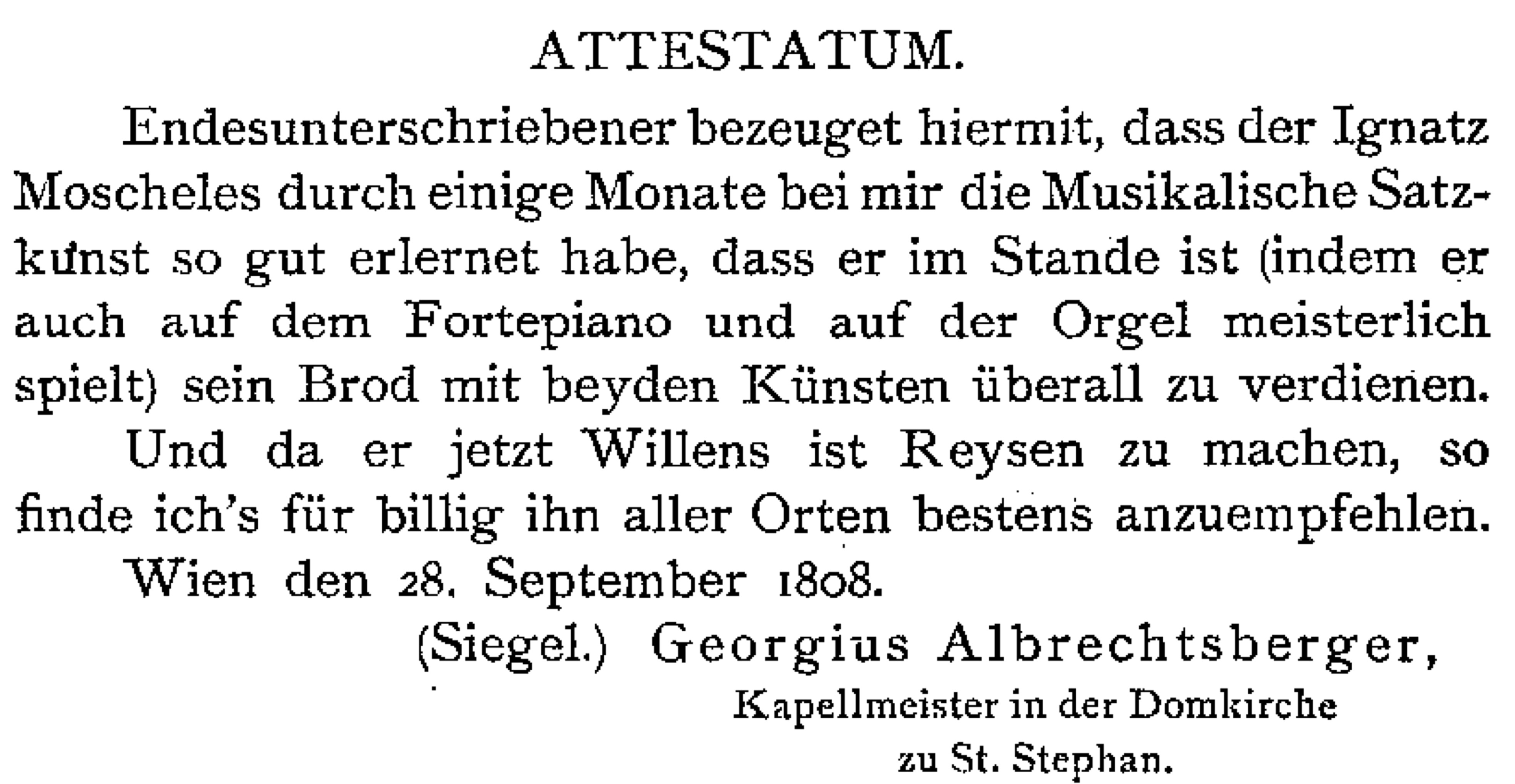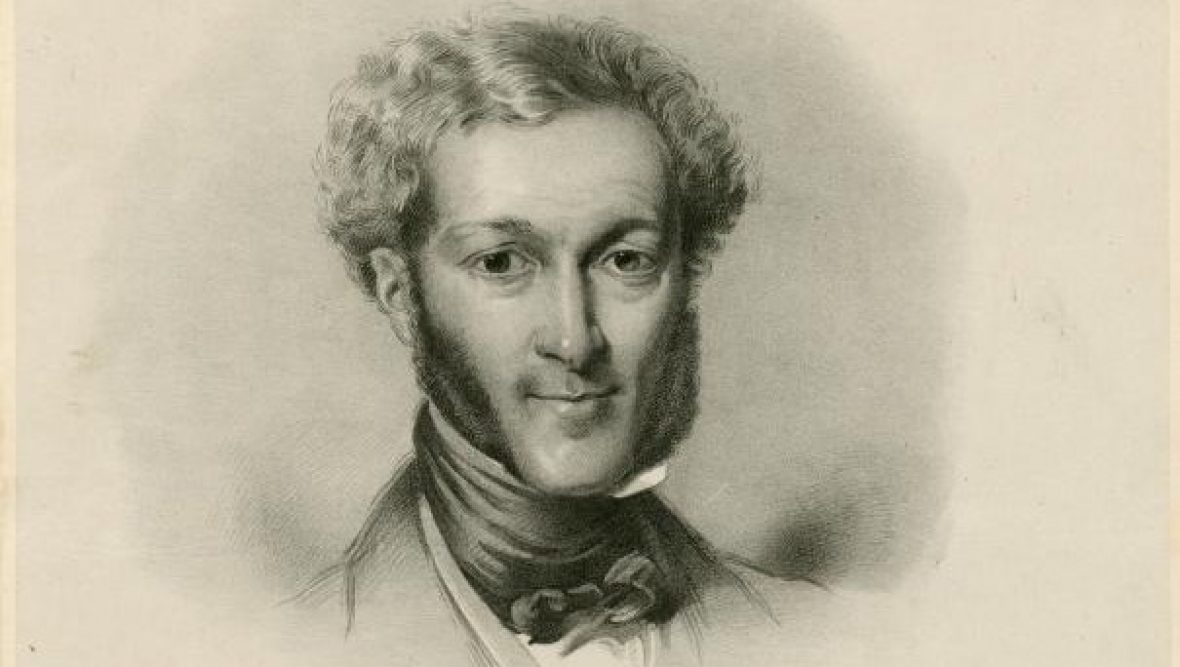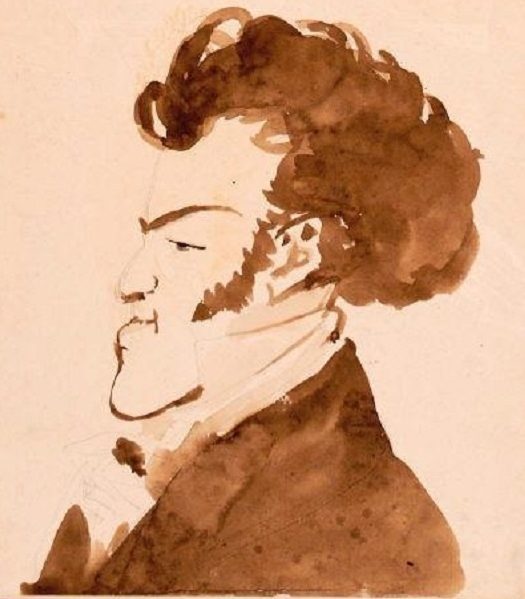
Continuing from my previous post, Ignaz Moscheles, in which I have given a general biography of the main points of Moschele’s life, The Harmonicon on May 1824 published a biography of Moscheles.
Moscheles in 1824 was planning to give concerts in England. Two concerts had already been advertised in the press: one in Bath on February 10, and one in Bristol on February 19. Unfortunately Moscheles, at that time had fallen ill and for four months had stayed home in Prague under the care of his mother.
‘No sooner had he arrived at Prague than he became dangerously ill, and was laid up for four months in his mother’s house. He was therefore obliged to forfeit his engagements in England for the winter and spring. The newspapers actually announced his death, but severe as the crisis was through which he passed’. (RMM, 61)


Due to his absence, many papers announced him dead. In May 1824, The Harmonicon, contradicted the rumour and quoted Moscheles from one of his letters:
A few months later, in October, The Harmonicon, published the memoirs of Moscheles. The article discusses briefly Moscheles’ youth and how his interest in music evolved and developed. The specific ‘story’ is the same one told by Charlotte Moscheles in her book Recent Music and Musicians, as described in the diaries and correspondence of Ignatz Moscheles.
In Moscheles words:
“In those days I heard the great French Revolution and all its horrors constantly discussed. Military instincts were uppermost, even in the minds of boys, and there was no end to the playing at soldiers. When the military band performed parade music in front of the guardhouse, I was seldom absent. The bandsmen got little boys to hold their music for them, and I was always at hand to undertake the duty. Coming home all enthusiasm from these street concerts, I used to say, ‘I too will be a musician’ (Spielmann)[ Ich will auch Spielmann werden]. My father…played the guitar, and sang as well. I owe to him my first impulses towards a musical career, for he used constantly to say, ‘One of my children must become a thoroughbred musician’—words which made me desire that I might be that one child. My father, however, began with my eldest sister. During her pianoforte lessons, I used to stand, mouth and ears wide open, by the upper C (the extreme limit of the little instrument), watching how my sister worked her way through the little pieces, which she never thoroughly mastered. When by myself I had tried to spell out these same pieces, it seemed to me anything but a difficult matter. My sister’s clumsy playing was trying to my temper, and on one occasion I forgot myself so far as to call out, ‘Dear me, how stupid ! I could do it better myself.’ Zadrakha, the old master, chuckled incredulously, but allowed me nevertheless to jump up on the music-stool and play instead of my sister. His report to my father must have been a favorable one, for a few days afterwards I was suddenly informed that a trial should be made with me instead of my sister” (RMM, 1-2)

Later on in Vienna, he studied the theory of music, bass and counterpoint, with Albrechtsberger and afterwards he became a pupil of Salieri, where he was also offered to become ‘his deputy Kapellmeister at the Opera for three years’.
Moscheles’ admiration of Beethoven started from the age of 7; at the time his teacher was Horzelsky. As he writes: ‘Although but seven years old, I actually ventured upon Beethoven’s Sonate Pathetique. Imagine if you can how I played it ; imagine also the Beethoven fever, to which I fell a victim in those days—a fever which goaded me on to mangle the other great works of the immortal author.’ (RMM, 3). To his disappointment though, it felt like he was “expelled from Paradise” (RMM, 4). His next teacher, Dionys Weber, forbade him from playing Beethoven: “The first year he must play nothing but Mozart, the second Clementi, and the third Bach ; but only that—not a note as yet of Beethoven, and if he persists in using the circulating libraries, I have done with him for ever”. (RMM, 4) Nevertheless, this had not seized his love for Beethoven, and as I already discussed in my previous post (Ignaz Moscheles) Moscheles firstly met Beethoven in 1810.
The Article by The Harmonicon, October 1824
[or you may read the article from the original published article found at the end of the page]:
MEMOIR OF IGNATZ MOSCHELES
Moscheles was born on the 30th of May, 1794, at Prague, in Germany, which though, for general civilization, far below most other provinces of the German empire, certainly yields to none in music. If the heroes of literary as well as civil history, as Dr. Johnson says, are often more remarkable for what they have suffered, than for what they have achieved, this observation does not in the least apply to the subject of the present memoir. There are, on the contrary, few men, eminent in science or art, whose life has been so uniformly happy and prosperous; whose road to excellence has been so agreeably cleared of discouraging obstacles, as that of M. Moscheles. Being born with as much genius as love for music, in a city which at all times has abounded in first-rate masters, and of parents, who, being themselves musical, omitted nothing that could contribute to qualify their favourite child for great attainments in his art, the extraordinary perfection of M. Moscheles seems no more than the natural result of such a combination of advantages.
Moscheles gave the first indication of his talent for music so early as his fifth year, since which the study of the art appears to have taken entire possession of his inclination. When his eldest sister received her lessons on the clavichord (the piano-forte at that time being but little known in Bohemia) he could not be restrained from being present, and manifested his impatience whenever she did not immediately comprehend her master’s instruction, and frequently cried out with much impatience, “Wrong, wrong,” if she failed in striking the right key. It was then his amusement, after her lesson, to find out for himself on the same instrument the airs he had just heard; a piece of musical research, in which he was always more or less successful. These, and similar prognostics of future eminence, induced his father, after having had him instructed in the elements of the science, by an old organist, named Zaradka, to place him under Dionys Weber *, the great theorist, and justly-famed director of the Conservatory of Music at Prague.+
Weber put young Moscheles, now in his eighth year, to several very severe trials of skill, in order to obtain a positive proof of the wonderful genius which the boy was said to possess, who having acquitted himself on these occasions, in a convincing manner, his master gladly undertook to complete his entire musical education within the period of four years, on condition that his pupil should, at any hour of the day the tutor pleased, be at his command for receiving instruction.
Moscheles had now to devote all his time (except the few hours which were employed in Latin and the other small branches of learning generally taught in schools) to the more delightful art and science of music. The road to and from his master’s house was, indeed, a lively type and illustration of the difficulties which he must encounter, who would
Climb the steep ascent of Fame;
for he was obliged to travel, through all seasons of the year, a long and irksome distance up and down hill, from the old town to the new, to receive his lessons. But so far, however, from becoming tired or disgusted with his musical pursuits, he still shewed the most decided aversion to every other profession. The severe pain his father had given him, by making him copy mercantile letters, with a view to frame his mind for his own profession, that of a merchant, could only be compensated by the noble present he at that time made him of a piano-forte. By his own confession, the little artist forgot, on this great occasion, eating, and drinking, and the other usual habits of every-day life, and could not be separated from his instrument, or prevented from endeavouring to express his joy and delight in extempore fantasies.
This event, though very unimportant in itself, gave a new and powerful impulse to his exertions; and with the excellent instruction of his master, who made it his business to develop, in a systematic manner, the whole extent of his natural abilities, he made within one year so rapid a progress, that he was able to play the works of Mozart and Clementi, with a precision and taste, that excited the wonder of all connoisseurs. His master observed in his style of playing a predilection and disposition for the grave and solemn, and immediately determined to turn this to account. He introduced him to the acquaintance of the old masters, in what is called the “strict style,” particularly Handel and Bach, and steadily insisted upon his pupil’s confining his studies to the works of these admirable men, but above all to accomplish the performamce (sic) of their fugues in their true spirit of energy and grandeur. May this example not be lost upon young musicians, who would wish to attain permanent eminence. M. Moscheles admits that he cannot sufficiently extol the advantages which he derived from this mode of teaching. He thereby gained an entire command over his instrument, and combining, with the most brilliant execution and refined expression, a quickness of reception, and presence of mind, was soon enabled to play, at first sight, even pieces of excessive difficulty.
Having now acquired the chief principles of the theory of music, his inclination for composing could no longer be restrained. Unfortunately, but naturally for so aspiring a genius, he first attempted the different modes of grand composition; but as they did not, in a wiser hour, prove very satisfactory even to himself, he withdrew those juvenile productions for ever from the public eye.
Little Moscheles, however, at the early age of eleven, passed for the first piano-forte player in Prague; and in public concerts made an extraordinary sensation, his musical reputation as a child being fully equal to that of Liszt or even of Hummel, to whom he may be compared in many other respects. The Leipzic Musikalische Zeitung of 1806 is boundless in its praises of his performance of Mozart’s piano-forte concertos, and concludes by saying, “It is wonderful what this child is capable of, even in composition.”
Thus gifted, and furnished with every thing that was calculated to ensure supreme excellency at a maturer age, he repaired in his fourteenth year to Vienna, then the seat of men of the rarest talents. The acquaintance of the great Haydn, who already stood on the brink of the grave, could not fail to inspire him with new ardour. Albrechtsberger, the master of the immortal Beethoven, and of every Viennese artist who has acquired some fame, and the most celebrated teacher of the theory of music that Vienna, and perhaps all Germany, ever had to boast, added another noble name to the list of his pupils, and became the master of Moscheles. Agreeably to the practice of many Viennese artists, who have often three separate masters, one for instruction in playing, another for the theory, and a third for the vocal branch, Moscheles chose an Italian vocal composer, in preference to a German, and, like Hummel, took lessons of Salieri, the grand maestro di capella to the emperor. It is well known, that Moscheles became in a short time the favourite of this great master, both on account of his promising abilities and his agreeable and engaging manners; and the zeal with which Salieri endeavoured to awaken in him a talent for vocal composition, or at the least to give his instrumental pieces more melody and flow, deserve most honourable mention. In order to promote the views of his pupil in every possible way, Salieri procured him an excellent situation as “Chapel master, adjunct,” at the Imperial Theatre for three years, which afforded him the finest opportunity of becoming intimately acquainted with the nature and management of grand orchestral music. Yet, notwithstanding so many extraordinary advantages, M. Moscheles has often confessed to his friends, that he owes the best part of his musical attainments, both as a player and as a composer, to his own study and indefatigable application.
He had now become the great attraction at all the most fashionable concerts of the capital; Hummel and himself being universally allowed to be the two greatest piano forte players in Germany. A young man who has been fortunate enough to gain a reputation like this in Vienna, may make himself perfectly easy as to his success in every other great city of the empire.
Hence M. Moscheles was received in every part of the country, particularly at the courts of Bavaria and Saxony, with the most flattering applause. In 1820 he set out on a musical tour through Holland, France, and England; the brilliant success he met with at Amsterdam, Paris, and London, must be in every one’s recollection. The years 1821 and 1822 he passed alternately in France, (where he gave a concert in different towns jointly with Lafont, the violin player,) and in England. In 1823, he proceeded, in the month of August, with a friend, on another tour to Frankfort, Munich, and Vienna. In this latter metropolis, he was, as might have been expected, most enthusiastically received, and produced a sensation such as has, perhaps, been never before witnessed. The most impartial judges agreed in considering his playing as the ne plus ultra ; and they could imagine nothing more perfectly brilliant or more exquisitely finished. Towards the close of the same year, he set out for his native town of Prague, being now in the zenith of his fame, and in the full possession of every thing, after which mortal beings so eagerly strive. No sooner, however, had he arrived in that city, to enjoy, in the midst of his dearest relations, that long and anxiously-looked for domestic happiness, which he had been deprived of for so many years, than he was attacked by a severe malady, under which he has been lingering, frequently in danger of life, nearly up to the present moment; but as he is fast approaching to perfect recovery, this country will, most likely, see him once again at the commencement of the new year. The concern with which the news of his illness, and the subsequent report of his death, were received here, in Germany, and in France, bears ample testimony to the estimation in which he is held both for his talent, and for the goodness of his moral character.
To say much of his compositions is needless; they are all stamped with the character of originality; are exceedingly full of fancy, and peculiarly well adapted to the astonishing extent and versatility of his own powers of playing. In nearly all of them the beneficial effects of a strictly classical education, and of a sound study of the imperishable models of Bach, Handel, and Mozart, may be easily discerned. His principal works are, his piano-forte concertos; a sonata dedicated to Beethoven: “The Fall of Paris,” one of the most brillant and effective of his productions; the sestetto in G, and the grand duet which he performed in London with Mr. J. B. Cramer.
* There are three individuals of great musical celebrity bearing this name, all natives of Germany, but in no way related to each other : Anselm Weber (lately deceased), maestro di capella to the King of Prussia, author of many successful operas; the well known Freischutz composer, Carl Maria von Weber; and the above mentioned Dionys Weber.
+ Of which we shall give an account in our next Number.”



